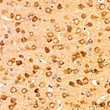| Tissue Specificity | Expressed in testis, including in Leydig cells and in the seminiferous epithelium, in differentiating cells from the spermatogonia to mature spermatozoa stages and round spermatids (at protein level). Expressed in 99.2% of spermatozoa from healthy individuals, but only in 28.6% of macrocephalic spermatozoa from infertile patients (at protein level). |
| Post Translational Modifications | Palmitoylation is critical for proper membrane localization and signaling. Phosphorylation on Thr-203 by PKA destabilizes the heterotrimer of alpha, beta and gamma, and inhibits Rho activation. |
| Function | Guanine nucleotide-binding proteins (G proteins) are involved as modulators or transducers in various transmembrane signaling systems. Activates effector molecule RhoA by binding and activating RhoGEFs (ARHGEF1/p115RhoGEF, ARHGEF11/PDZ-RhoGEF and ARHGEF12/LARG). GNA13-dependent Rho signaling subsequently regulates transcription factor AP-1 (activating protein-1). Promotes tumor cell invasion and metastasis by activating RhoA/ROCK signaling pathway. Inhibits CDH1-mediated cell adhesion in process independent from Rho activation. |
| Protein Name | Guanine Nucleotide-Binding Protein Subunit Alpha-13G Alpha-13G-Protein Subunit Alpha-13 |
| Database Links | Reactome: R-HSA-193648Reactome: R-HSA-416482Reactome: R-HSA-428930Reactome: R-HSA-456926Reactome: R-HSA-9013148Reactome: R-HSA-9013149 |
| Cellular Localisation | Cell MembraneLipid-AnchorMelanosomeCytoplasmNucleusIdentified By Mass Spectrometry In Melanosome Fractions From Stage I To Stage IvDetected In The Cytoplasm Of Leydig Cells And In The Seminiferous EpitheliumIncluding Differentiating Cells From The Spermatogonia To Mature Spermatozoa StagesIn Round SpermatidsAlso Present In The Nuclei |
| Alternative Antibody Names | Anti-Guanine Nucleotide-Binding Protein Subunit Alpha-13 antibodyAnti-G Alpha-13 antibodyAnti-G-Protein Subunit Alpha-13 antibodyAnti-GNA13 antibody |
Information sourced from Uniprot.org











